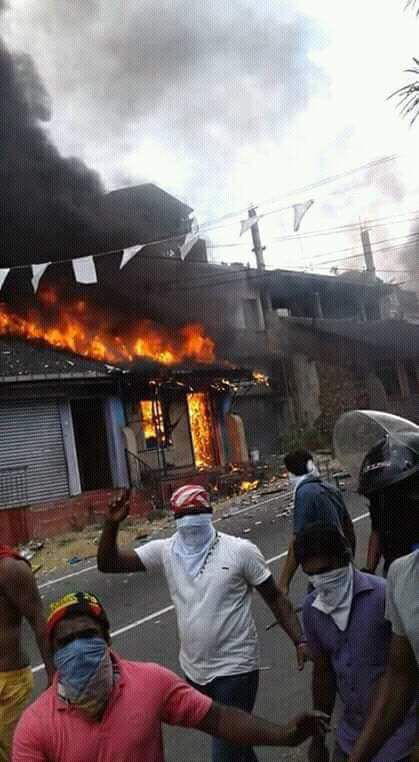Multi-Religious Society: No More Conflicts
By N.M. Rishard –APRIL 19, 2018
 As we all know that world order has changed dramatically. Many countries particularly western countries experience different challenges due to its new phenomena resulted by this new world order. For instance, migration to west as refugees is significant consequences of modern days. The war in some part of Middle East countries compelled their respective citizens to migrate to another country hoping to lead a peaceful life. Besides, they are given opportunities to pursue their higher studies in high ranked universities such as oxford and Harvard. The PhD holders prefer securing any related jobs for their respective fields to returning to their motherland. This is the same thing what happens to the people who go to western countries to gain any jobs. This unprecedented trend that brought various cultures, religions, ethnics and castes into a specific environment, has created some major challenges.
As we all know that world order has changed dramatically. Many countries particularly western countries experience different challenges due to its new phenomena resulted by this new world order. For instance, migration to west as refugees is significant consequences of modern days. The war in some part of Middle East countries compelled their respective citizens to migrate to another country hoping to lead a peaceful life. Besides, they are given opportunities to pursue their higher studies in high ranked universities such as oxford and Harvard. The PhD holders prefer securing any related jobs for their respective fields to returning to their motherland. This is the same thing what happens to the people who go to western countries to gain any jobs. This unprecedented trend that brought various cultures, religions, ethnics and castes into a specific environment, has created some major challenges. When it comes to Sri Lankan context, it is totally different to that of above mentioned reality. Many studies have apparently proved that all communities in Sri Lanka irrespective of their identities have led a peaceful and harmonious life for more than thousand years without downgrading each other, even though there were few exceptional incidents emerged in the past history. Therefore, pluralism having different religious identities and ethnic backgrounds is not a new phenomenon to us as Sri Lankans; rather it rooted very profoundly in the blood of this nation. Unfortunately, ethnic polarization erupted in middle of 70s and later, it emerged as a war between the Sri Lankan government and LTTE which claimed for a separate and autonomous land. Three decades of war were filled by black memories such as eviction, robber, murder, kidnapping, torture and bomb explosion that put the country down economically, politically and socially. During the war that was intensified in Northern Province, entire nation including the people who were in southern region faced many difficulties and hardships. For instance, bus journey from Kandy to Colombo that was only 115 kilo meters had to pass through more than five check points where all passengers should get down with their bags for the security purposes.
When it comes to Sri Lankan context, it is totally different to that of above mentioned reality. Many studies have apparently proved that all communities in Sri Lanka irrespective of their identities have led a peaceful and harmonious life for more than thousand years without downgrading each other, even though there were few exceptional incidents emerged in the past history. Therefore, pluralism having different religious identities and ethnic backgrounds is not a new phenomenon to us as Sri Lankans; rather it rooted very profoundly in the blood of this nation. Unfortunately, ethnic polarization erupted in middle of 70s and later, it emerged as a war between the Sri Lankan government and LTTE which claimed for a separate and autonomous land. Three decades of war were filled by black memories such as eviction, robber, murder, kidnapping, torture and bomb explosion that put the country down economically, politically and socially. During the war that was intensified in Northern Province, entire nation including the people who were in southern region faced many difficulties and hardships. For instance, bus journey from Kandy to Colombo that was only 115 kilo meters had to pass through more than five check points where all passengers should get down with their bags for the security purposes.
Another black page of this bloody conflict is explosions which were carried out by the terrorist group in public places. This scenario created fears and tension among general public. Moreover, we had to lost many lives of our relatives and neighbours. Specially, northern people suffered a lot. Most teenagers, at their age of education, were compelled by the terrorist group to join and carry weapons. Thousands of people including children, pregnant women and elders were evicted forcibly from north region and they were not given permission to take land deed or other documents with them. The war continued without having a sustainable solution even though several the peace negotiation talks were conducted very frequently with the mediation of foreign organizations in several occasions. However, the prolonged war came to an end after continuous sacrifices and dedications carried out by military forces. Former-president Mahinda Rajapaksha’s regime was able to eradicate the clutches of terrorism and the entire citizens, irrespective of religion and faith, celebrated the victory that is still considered as “second independence”. The expectation of the society at that time was to bring a real peace and co-existence among the communities that were not prevalence for approximately three decades. Mahinda Rajapaksha had a golden opportunity to re-unite the nation and to be celebrated as a national leader or hero. But, unfortunately, what happened was totally different to the aspirations of general public.
New public figures, who were totally absent during the past, emerged instantaneously and became the leader of some movements that appeared with religious identity even though directed by political players. Hate speeches against Sri Lankan Muslims stormed very often in public meetings and media conferences. Further, the newly emerged group of racists fostered the mistrust and misunderstanding among the communities. Such intensified propaganda had created some negative consequences in the collective phycology as well as attitude of both Sinhalese and Muslims. Brutal attacks, which were staged repeatedly in several places such as Aluthgama and Kandy, made a rift in the relationship between two respective communities. Both regimes, which came to power following to the victory, have somewhat failed to fulfil their promises in terms of the security of minority Muslim who played a pivotal role in nation building process throughout the history. Those who were in high positions and authorities, except few, prefer not to utter even a condemnation against the unethical and injustice attacks led by some religious leaders on innocent people.
Social media, especially Facebook and WhatsApp, played a negative role in promoting racism and bigotry. It is obvious that some people forwarded and shared what they received in social media without verifying the information. Some past incidents got rebirthed again and again. Hatred speeches that played with the emotions and feelings of the society were circulated by the followers.

